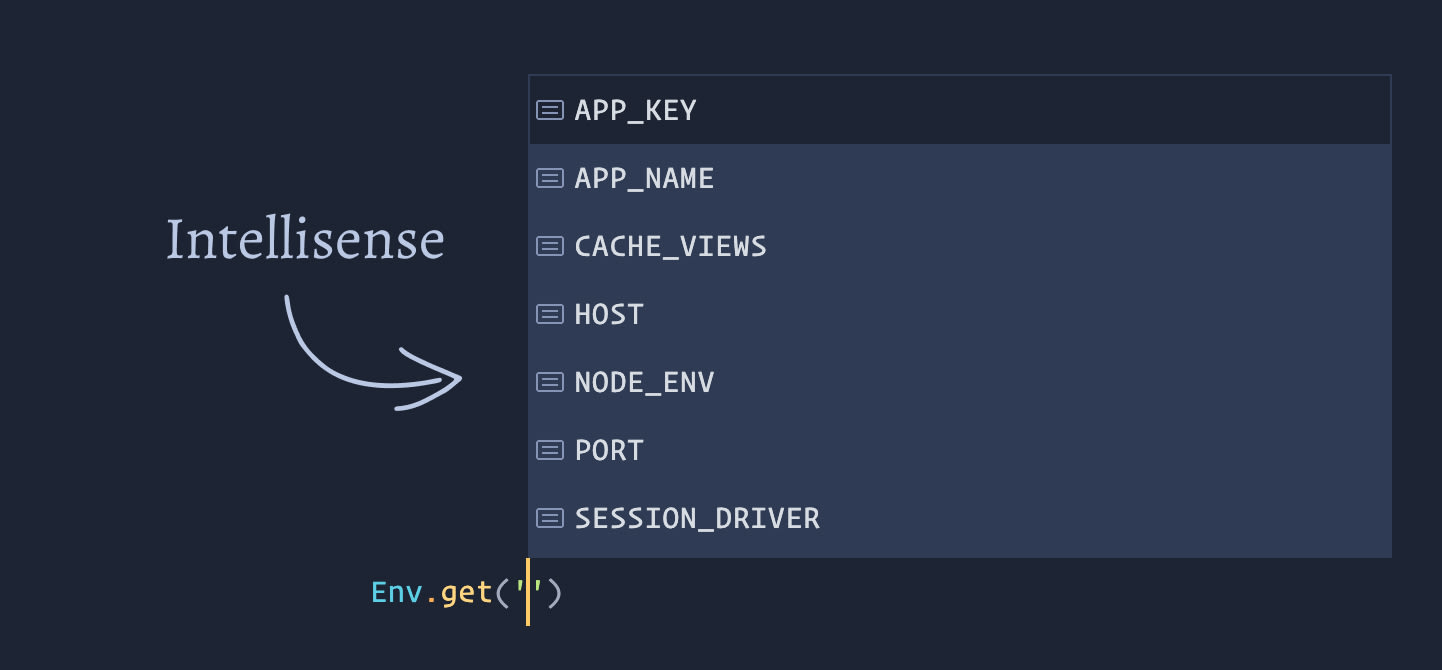Environment variables
Instead of maintaining multiple config files, one for each environment, AdonisJS uses environment variables for values that often change between your local and the production environment. For example: the database credentials, a boolean flag to toggle templates caching, and so on.
Access environment variables
Node.js natively allows you to access the environment variables using the process.env object. For example:
process.env.NODE_ENV
process.env.HOST
process.env.PORT
However, we recommend using the AdonisJS Env provider, as it further improves the API to work with environment variables by adding support for validations and provides static type information.
import Env from '@ioc:Adonis/Core/Env'
Env.get('NODE_ENV')
// With default values
Env.get('HOST', '0.0.0.0')
Env.get('PORT', 3333)
Why validate environment variables?
Environment variables are injected from outside-in to your application, and you have little or no control over them within your codebase.
For example, a section of your codebase relies on the existence of the SESSION_DRIVER environment variable.
const driver = process.env.SESSION_DRIVER
// Dummy code
await Session.use(driver).read()
There is no guarantee that at the time of running the program, the SESSION_DRIVER env variable exists and has the correct value. Therefore you must validate it vs. getting an error later in the program lifecycle complaining about the "undefined" value.
const driver = process.env.SESSION_DRIVER
if (!driver) {
throw new Error('Missing env variable "SESSION_DRIVER"')
}
if (!['memory', 'file', 'redis'].includes(driver)) {
throw new Error('Invalid value for env variable "SESSION_DRIVER"')
}
Now imagine writing these conditionals everywhere inside your codebase? Well, not a great development experience.
Validating environment variables
AdonisJS allows you to optionally validate the environment variables very early in the lifecycle of booting your application and refuses to start if any validation fails.
You begin by defining the validation rules inside the env.ts file.
import Env from '@ioc:Adonis/Core/Env'
export default Env.rules({
HOST: Env.schema.string({ format: 'host' }),
PORT: Env.schema.number(),
APP_KEY: Env.schema.string(),
APP_NAME: Env.schema.string(),
CACHE_VIEWS: Env.schema.boolean(),
SESSION_DRIVER: Env.schema.string(),
NODE_ENV: Env.schema.enum(['development', 'production', 'test'] as const),
})
Also, AdonisJS extracts the static type information from the validation rules and provides IntelliSense for the validated properties.

Schema API
Following is the list of available methods to validate the environment variables.
Env.schema.string
Validates the value to check if it exists and if it is a valid string. Empty strings fail the validations, and you must use the optional variant to allow empty strings.
{
APP_KEY: Env.schema.string()
}
// Mark it as optional
{
APP_KEY: Env.schema.string.optional()
}
You can also force the value to have one of the pre-defined formats.
// Must be a valid host (url or ip)
Env.schema.string({ format: 'host' })
// Must be a valid URL
Env.schema.string({ format: 'url' })
// Must be a valid email address
Env.schema.string({ format: 'email' })
When validating the url format, you can also define additional options to force/ignore the tld and protocol.
Env.schema.string({ format: 'url', tld: false, protocol: false })
Env.schema.boolean
Enforces the value to be a valid string representation of a boolean. Following values are considered as valid booleans and will be converted to true or false.
'1', 'true'are casted toBoolean(true)'0', 'false'are casted toBoolean(false)
{
CACHE_VIEWS: Env.schema.boolean()
}
// Mark it as optional
{
CACHE_VIEWS: Env.schema.boolean.optional()
}
Env.schema.number
Enforces the value to be a valid string representation of a number.
{
PORT: Env.schema.number()
}
// Mark it as optional
{
PORT: Env.schema.number.optional()
}
Env.schema.enum
Forces the value to be one of the pre-defined values.
{
NODE_ENV: Env
.schema
.enum(['development', 'production'] as const)
}
// Mark it as optional
{
NODE_ENV: Env
.schema
.enum
.optional(['development', 'production'] as const)
}
Custom functions
For every other validation use case, you can define your custom functions.
{
PORT: (key, value) => {
if (!value) {
throw new Error('Value for PORT is required')
}
if (isNaN(Number(value))) {
throw new Error('Value for PORT must be a valid number')
}
return Number(value)
}
}
- Make sure to always return the value after validating it.
- The return value can be different from the initial input value.
- We infer the static type from the return value. In this case,
Env.get('PORT')is a number.
Defining variables in the development
During development, you can define environment variables inside the .env file stored in your project's root, and AdonisJS will automatically process it.
PORT=3333
HOST=0.0.0.0
NODE_ENV=development
APP_KEY=sH2k88gojcp3PdAJiGDxof54kjtTXa3g
SESSION_DRIVER=cookie
CACHE_VIEWS=false
Variable substitution
Along with the standard support for parsing the .env file, AdonisJS also allows variable substitution.
HOST=localhost
PORT=3333
URL=$HOST:$PORT
All letter, numbers, and the underscore (_) after the dollar ($) sign are parsed as variables. If your variable contains any other character, then you must wrap it inside the curly braces {}.
REDIS-USER=foo
REDIS-URL=localhost@${REDIS-USER}
Escape the $ sign
If the value of a variable contains a $ sign, you must escape it to prevent variable substitution.
PASSWORD=pa\$\$word
Do not commit the .env file
The .env files are not portable. Meaning, the database credentials on your local and your production environment will always be different, and hence there is no point in pushing the .env to the version control.
You must consider the .env file personal to your local environment and create a separate .env file on the production or the staging server (and keep it secure).
The .env file can be at any location on your server. For example, You can store it inside /etc/myapp/.env and then inform AdonisJS about it as follows.
ENV_PATH=/etc/myapp/.env node server.js
Defining variables during tests
AdonisJS will look for the .env.test file when the application is started with the NODE_ENV=test environment variable.
The variables defined inside the .env.test file are automatically merged with the .env file. This allows you to use a different database or a different session driver when writing tests.
Defining variables in production
Most modern-day hosting providers have first-class support for defining environment variables within their web console. Make sure you read the documentation for your hosting provider and define the environment variables before deploying your AdonisJS app.